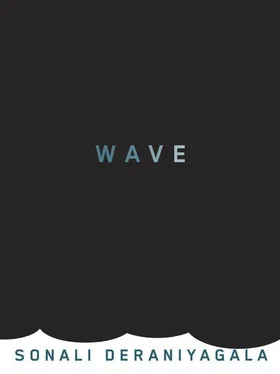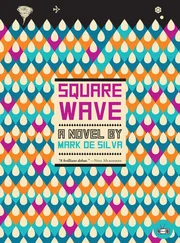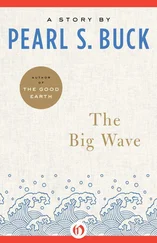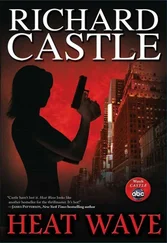I want to put them back in here, I just want to put them back. They would so want to be here, they loved this house.
This is exactly how I know our home to be. And now I find myself at ease. It feels natural, despite my protestations to myself that this is not ordinary or natural because they are not here and will never be. Before coming back here, I expected to be assailed by objects that I’d forgotten. But there are no surprises. I brace myself and open the wardrobes upstairs. Do I dare look at their clothes? Something is going to get me now surely. Cautiously, I open door after door and drawer after drawer. But it is all as I know it to be. There is not one sock that I pull out and think, I don’t remember this one. And after all the rummaging, my eyes cling to a white school shirt of Vik’s, all washed and ironed, waiting patiently on its hanger. He wore this to his school Christmas concert the night before we left London. I hesitate, then take the shirt off its hanger and hold it, feeling its softness. None of this so menacing now.
How I relished my time alone at home back then, on those days when I was meant to be working from home and the boys were at school and Steve at the office. I would wander the house, put out the washing, make some tea, and maybe look out for the woodpecker that hammered holes in our garden shed. And here I am now, after our life ended, sitting on the floor of our living room, leaning against the sofa and staring at the tops of those overgrown apple trees with that same tranquillity stealing up on me. And I slip into my old ways, unthinkingly.
I begin tidying up a bit, putting things where they should be, or where I always thought they should be. What’s Vik’s cricket bat doing on the mound of soft toys? I pick it up and stand it by the box with the balls and bails, that is its rightful place. And Malli’s puppets go with his dressing-up stuff. There is a bath mat by the radiator, I put it down by the shower. This laundry is clean, I should fold it. I carry the basket to the boys’ room. And then I stop myself. What am I doing? Who am I readying the house for, they are not coming back. Don’t be a fool, this is mad.
But I can’t stop. I go into the kitchen and switch on the fridge. It doesn’t feel right without that hum. I boil the kettle for no reason. On the draining board by the sink are two thin wooden placemats, Steve and I would have used them at dinner on our last night in the house. I wipe them and stack them on the shelf. And I pick up a small faded blue plastic bowl that’s on the kitchen table. Anita and I found this in the middle of the lawn when I first walked into the garden earlier in the day. I recognized it in an instant then. It was the bowl that Vik ate his first solid food from when he was a few months old, one spoon of baby rice mixed in water. It must have become a garden toy over the years, we wouldn’t have given it a second thought. Anita was surprised to see that bowl on the lawn. It wasn’t here last evening, she insisted, she’d walked in the garden after the gardener cut the grass yesterday. So it must have been the foxes that brought it out later at night, then.
I stare at this little dirt-covered bowl, remembering Vik kicking his legs as he spat out his first mouthful of food. And I don’t rush outside to put it away where it belongs, in the shed with the rest of the garden toys. It wouldn’t be mad or foolish to keep it indoors now.
S arah, Niru, Fionnuala, and I sit around my kitchen table. It is a dull autumn afternoon, the sun punctures the gray now and then. We drink tea and nibble dark chocolate, maybe expecting it to revive us a little. We are still shaken. An hour ago, when they each rang the doorbell and I opened the door to them, we couldn’t stop sobbing. We are together in my home in London after nearly four years.
And this is what we did so often. Back then. Our children had been constants in each other’s lives, ever since Noah and Alex and Finian and Vikram were a year old maybe, ever since we wheeled them to our local library for story time. And over the years, as our children went through school together, the four of us would gather regularly to catch up on our news — about work, about home, about the play Sarah and I saw at the Donmar that week. There would sometimes be a whirl of children about us, sometimes not. Those precious school hours I should have dedicated to that paper on the macroeconomic policy in Nepal were readily sacrificed for a good gossip.
Now we are in this same kitchen, after it has all ended. This is something I was sure we’d never do again. Even when I decided to make a second visit to our home and stay a few days, this was not part of the plan. It would be too awful, it would be too familiar, and that would be unbearable, I thought. But I’d only been back some hours when I called my friends over. And then I panicked. This will be different from when we’ve previously met up in London in these last four years. Those surroundings — the café at Foyles bookshop, that Turkish restaurant in St. John’s Wood — kept reality at bay, somewhat. But here in my home, I will be destroyed by getting too close to the life I lost.
And I was right. We sit here, and I lapse into thinking that nothing has changed, no one has died. It is one of those afternoons when Fionnuala and I take our sons to their football class in that sports hall, which, for some strange reason, we have to enter through a locker room full of partially clothed young men who’ve just played basketball, not that we complain. Then I have to remind myself. That life is over. But how can it be? Sitting here, that seems impossible. The steam from this kettle rises and drifts towards the window above the sink, just as it always did. That tap still drips if I don’t give it an extra twist. The boys’ mud-covered shoes are reassuringly by the kitchen door, they could have just come inside. And the green and pink marks on this kitchen table from Malli’s colored pens are as bright as jelly beans.
My friends find the house calm and inviting, no different from before. They were nervous coming back here, not knowing how they’d react. For years now, they have looked away whenever they drove past our street. Today Niru was jolted by the sight of the garden, flashes of the boys’ birthday parties we had there. Now we eat more chocolate and talk about those parties. We laugh, remembering Vik booting a ball through the window next door. We were sitting right here when we heard that shattering of glass.
We laugh, and I am unsettled. Why do I feel this lightness? This is indeed like the old times, but it seems bearable, I am enjoying it even. Then I warn myself. I shouldn’t get too comfortable. Don’t I know that Malli will not stand on that chair again, wearing a pink tutu and licking cake mix off a wooden spoon? Steve will not come in the front door at seven, there will be no clatter as he empties his pockets onto the table in the hall. The windows next door will remain intact. Still, I am relieved to reenter the warmth of our life, even though I know that reality will get me, later.
And right enough, it does. In the evening, the hush in this house is intolerable. I turn up the music, I talk loudly to Sarah, who is staying over, but this silence keeps ricocheting off the walls. I find myself listening out for the boys and Steve. There is a box of half-eaten chocolates on a shelf in the guest room. I can almost hear Vik and my mother whispering in that bed at night as they tuck into those chocolates, Ma ignoring my protests that the boy has already brushed his teeth. I am stunned by the quiet in the playroom. I turn on the light and see some star-shaped tinsel glistening on the floor, an entire galaxy at my feet.
When I lie in our bed the power of their absence assails me. The sheets have not been changed since Steve and I last slept on them. I haven’t been able to bring myself to wash them, and so I sneeze all night. Steve’s sarong still hangs on the exercise bike by the window. But his shoulder is not under my head. On Steve’s pillow, the one his head hasn’t touched in nearly four years, there is an eyelash.
Читать дальше












